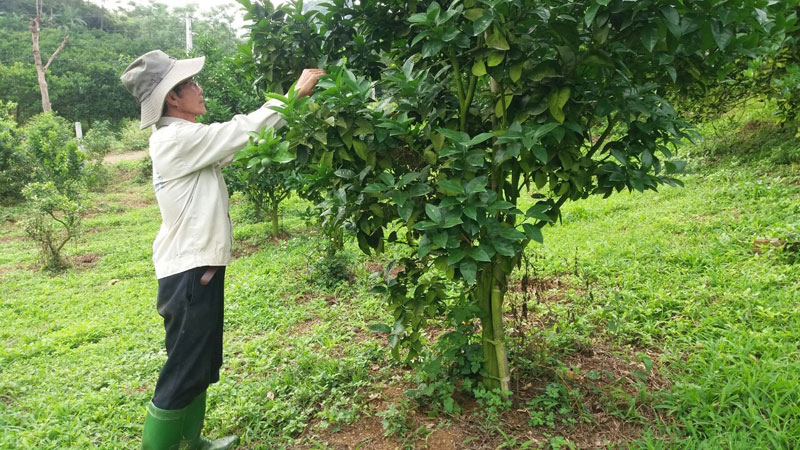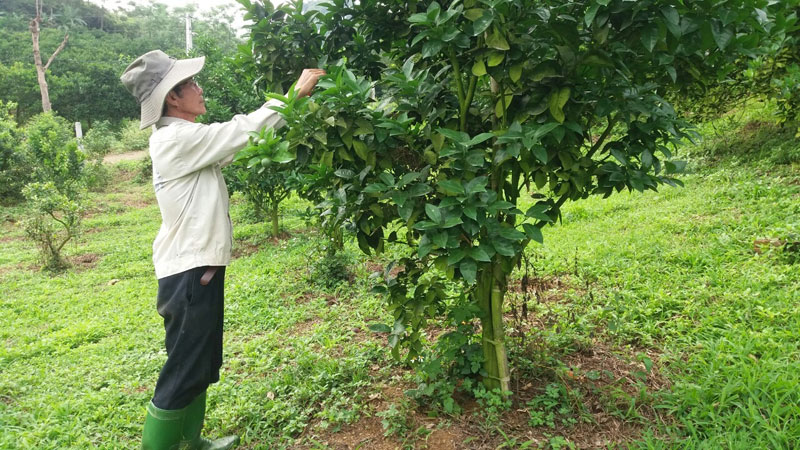
HBO – Lac Thuy district faced a lot of difficulties when beginning the implementation of the new-style rural area building programme.

Lien Hoa commune (Lac Thuy) works
to become new-style rural area in late 2018
With the determination of the entire political system and the high
consensus of locals, the building of new-style rural areas showed remarkable
progress just after a short time. To date, the rural transport system has
basically met locals’ demand for travelling and transporting goods. Irrigational
works ensure enough water for 75 percent of rice fields and 31 percent of the
total area of other crops, and for the daily life of locals. All communes and
villages are connected to the national grid and have a liaison information
system. Twelve out of 13 communes have standard trade infrastructure, and the
rate of standard houses reaches 83.56 percent.
Together with new-style rural building, Lac Thuy district has
focused all resources on socio-economic development to improve locals’
spiritual and material lives. In 2017, the district stepped up restructuring in
farming, forming concentrated production regions and large-scale fields. A
concentrated citrus region was initially formed on an area of 1,146ha, while
200ha of miscellaneous gardens were improved. Three value chains have been
implemented, including an exported chilli planting chain, a 40-ha safe
vegetable planting chain and a chicken raising chain with 10,000 head. In
addition, the operation of a safe food and farm produce cooperative has been
maintained. The district has also attracted businesses’ investment in producing
safe vegetables and medicinal plants following value chain linkage.
The district has five communes meeting new-style rural area
criteria, namely Dong Tam, Phu Lao, Co Nghia, Thanh Nong and Lac Long. Four
communes which complete 15-18 criteria are An Binh, Phu Thanh, Lien Hoa, and
Yen Bong, while the three communes of Khoan Du, An Lac ad Hung Thi meet 10-14
criteria. On average, each commune meets 15.69 criteria.
During 2018-2020, the district will need 996 billion VND for the
new-style rural area building, of which nearly 90 billion VND will come from
the State budget, while over 193 billion VND from the local budget, 105 billion
VND from integrated capital, 450 billion VND from credit loans, 75 billion VND
from businesses, and 91 billion VND mobilised from the public via cash, working
days and land donation./.
According to data from the Hoa Binh Provincial Party Committee, the industrial production index for the first six months of 2025 is estimated to have increased by 20% compared to the same period last year. This marks the highest year-on-year growth rate for this period since 2020.
In the first six months of 2025, Hoa Binh province’s export turnover was estimated at 1.145 billion USD, marking an 18.11% increase compared to the same period in 2024. Import turnover was estimated at $ 804 million, a 17.15% increase, which helped the province maintain a positive trade balance.
The lives of the ethnic minority farmers in Tan Lac district have gradually improved thanks to the new directions in agricultural production. This is a testament to the collective strength fostered through the professional associations and groups implemented by various levels of the district’s Farmers’ Union.
With the motto the "product quality comes first,” after nearly one year of establishment and operation, Muong village’s Clean Food Agricultural and Commercial Cooperative, located in Cau Hamlet, Hung Son Commune (Kim Boi district), has launched reputable, high-quality agricultural products to the market that are well-received by consumers. The products such as Muong village’s pork sausage, salt-cured chicken, and salt-cured pork hocks have gradually carved out a place in the market and they are on the path to obtaining the OCOP certification.
In the past, the phrase "bumper harvest, rock-bottom prices" was a familiar refrain for Vietnamese farmers engaged in fragmented, small-scale agriculture. But today, a new spirit is emerging across rural areas of Hoa Binh province - one of collaboration, organisation, and collective economic models that provide a stable foundation for production.
Maintaining growing area codes and packing facility codes in accordance with regulations is a mandatory requirement for agricultural products to be eligible for export. Recently, the Department of Agriculture and Environment of Hoa Binh province has intensified technical supervision of designated farming areas and packing facilities to safeguard the "green passport" that enables its products to access international markets.



